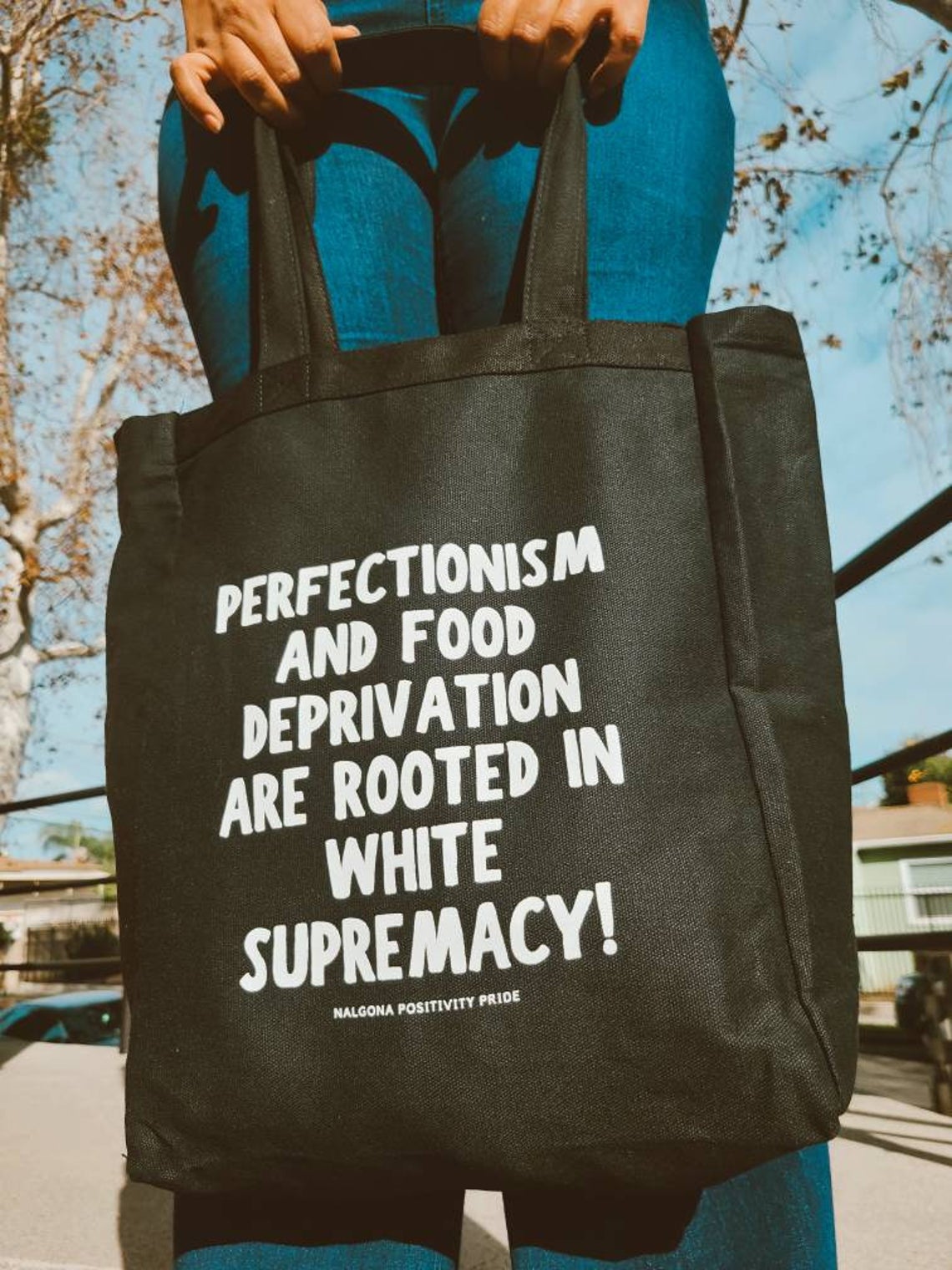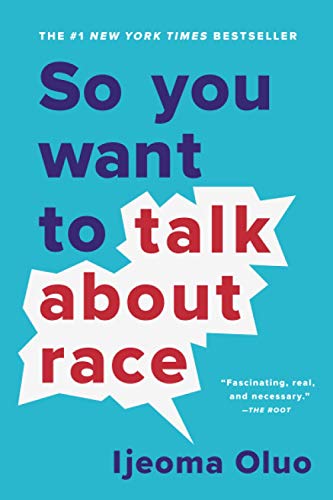Perfectionism and Food Deprivation Are Rooted in White Supremacy Tote Nalgona Positivity Pride
$25.00
Black tote that reads, “Perfectionism and Food Deprivation Are Rooted in White Supremacy” in white. Size: 10.5″ x 14″ x 5″
100% cotton canvas
Colors may vary slightly due to different color monitors and filters.
Made with love in Southern California
Description
Black tote that reads, “Perfectionism and Food Deprivation Are Rooted in White Supremacy” in white. Size: 10.5″ x 14″ x 5″
100% cotton canvas
Colors may vary slightly due to different color monitors and filters.
Made with love in Southern California
As seen in HuffPost, BuzzFeed, Remezcla, & NYLON.
“By ‘white supremacy’ I do not mean to allude only to the self-conscious racism of white supremacist hate groups. I refer instead to a political, economic and cultural system in which whites overwhelmingly control power and material resources, conscious and unconscious ideas of white superiority and entitlement are widespread, and relations of white dominance and non-white subordination are daily reenacted across a broad array of institutions and social settings.” -Frances Lee Ansley
“Perfectionism” and food deprivation (through dieting or socioeconomic barriers) have long been suggested to be linked in the development of eating disorders. Striving for “perfectionism” is a coping mechanism to avoid pain, be deemed valuable, seek power, and appease white standards. When we take a closer look at what constitutes the illusion of “perfectionism” it is the reproduction of white Western values in a white supremacist system. For example, the “perfect body” is commonly associated with slenderness, light skin, European facial features, etc. Perfectionism is often used to even, if not intentionally, make whiteness “the norm” and “supreme.’ Many attempt to align closer to white standards through the means of food restriction.
Like “perfectionism”, current food systems are legacies of past colonial subjugation such as genocide, slavery, environmental degradation, displacement, and ethnocide, etc,. All these factors changed Native peoples access to food and the spiritual and cultural connection to land. When addressing food insecurity in modern times, we have to examine the roles of structural racism. For example:
– From 2001 to 2016, food insecurity rates for both non-Hispanic black and Hispanic Households were at least twice that of non-Hispanic white households.
– American Indian/Alaska Natives are twice as likely to be found food insecure compared to whites
– Racial discrimination limits people of color’s access to educational and employment opportunities resulting in social and economic consequences that could lead to food insecurity.
– African American are incarcerated in state prisons at a rate that is five times that of whites. Consequently, policies that restrict employment for individuals who were previously incarcerated could disadvantage people of color, contributing to food insecurity.
– Gendered relations of power add another layer that make womxn of color and their children susceptible to greater economic hardships and food insecurity.
The detrimental effects of food insecurity have been linked to “higher levels of binge eating, overall eating disorder pathology, any-reason dietary restraint, weight self-stigma and worry.”
George Lipsitz states, “whiteness never has to speak its name, never has to acknowledge its role as an organizing principle in social and cultural relations.” Conclusively, eating disorders are connected to the pressures of “perfection” and food insecurity that are rooted in white supremacy. Understanding how structural racism pervades society will give us the tools to both prevent and heal from eating disorders and dismantle colonialism and white supremacy.
1 Brewer, Laura. “The Practice of Perfectionism.” Do The Heart Work, 22 Jan. 2018, www.dotheheartwork.com/project/the-practice-of-perfectionism/.
2 Odoms-Young A., Bruce M.A. Examining the Impact of Structural Racism on Food Insecurity: Implications for Addressing Racial/Ethnic Disparities. Fam. Community Health. 2018;41:S3–S6.
3 Slocum, Rachel. “Dismantling Racism in Community Food Work.” NYC Food Policy , Hunter College , 15 Oct. 2004. www.nycfoodpolicy.org/wp-content/uploads/2015/02/Dismantling-Racism-in-Community-Food-Work_Rachel-Slocum_2004.pdf
4 Becker, Carolyn & Middlemass, Keesha & Taylor, Brigitte & Johnson, Clara & Gomez, Francesca. (2017). Food insecurity and eating disorder pathology. The International journal of eating disorders. 50. 10.1002/eat.22735
………………………………….
🌍 SHIPPING
Do take note that our shipping time frames vary from a couple of days to a week. Is your order time-sensitive? Send us a message. Thank you for the support.
………………………………….
✨The MISSION BEHIND THE MERCH✨
Nalgona Positivity Pride (NPP) is an in-community eating disorders and body-positive organization dedicated in creating visibility and resources for Black, Indigenous, communities of color (BICC.) Since 2016, NPP has been raising awareness around the specific needs of BICC through digital media, education, grassroots eating disorders treatment models, and art. Rooted in Xicana indigenous feminism and DIY punx praxis, NPP emerged out of a great need not only to shed light on the experiences and barriers that exist in BICC affected by body-image and troubled eating but to create opportunities of healing by and for BICC.
www.nalgonapositivitypride.com
Instagram: @nalgonapositivitypride
Be the first to see our merch before we release by signing up to our email list: https://bit.ly/2AsP7Tc





